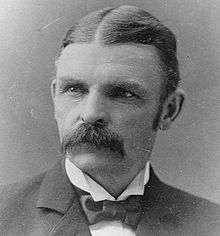William A. Richards
| William Alford Richards | |
|---|---|
 |
|
| 4th Governor of Wyoming | |
|
In office January 7, 1895 – January 2, 1899 |
|
| Preceded by | John Eugene Osborne |
| Succeeded by | DeForest Richards |
| Personal details | |
| Born | March 9, 1849 Hazel Green, Wisconsin |
| Died | July 25, 1912 (aged 63) |
| Political party | Republican |
William Alford Richards (March 9, 1849 – July 25, 1912) was an American surveyor, rancher and politician. He was the fourth Governor of Wyoming from January 7, 1895 until January 2, 1899.
Richards was born in Hazel Green, in Grant County, Wisconsin, and educated there and in Galena, Illinois. During the Civil War he served as an ambulance driver for the Army of the Potomac.
As a young man Richards worked on surveying missions in Nebraska, and first came to Wyoming in 1873 when his brother Alonzo V. Richards hired him as his general assistant while surveying the southern boundary of Wyoming Territory.
The next year they returned for the survey of the western boundary of Wyoming. Alonzo left the expedition after 99 miles, leaving William in charge of completing the survey. William moved to California, to marry Harriet Alice Hunt in 1874. The couple had three daughters, Eleanor Alice, Ruth Louise, and Edna Maude. In 1885 he returned to Wyoming, homesteading a ranch in Big Horn County. In 1886 he was elected county commissioner of Johnson County, and in 1889 President Harrison appointed him Surveyor General for Wyoming.
In 1894, Richards ran for Governor on the Republican ticket. He defeated William H. Holliday and Lewis C. Tidball, becoming the state's third elected governor. He served as Governor from 1895 to 1899. Though he helped defuse the Jackson Hole Indian Crisis of 1895, Richards is most famous for pardoning Butch Cassidy. Then a small-time rustler, Cassidy was serving a two-year term in the State Penitentiary for possession of a stolen horse worth only $5. Citizens of Fremont County, fearing Cassidy's return, asked the governor for a pardon in hopes it "would have much to do in causing him to become a law-abiding citizen," Richards wrote to a concerned rancher, Jay Torrey. Richards had interviewed Butch at the Penitentiary and pardoned him after hearing reassuring words from the prisoner. Cassidy "told me that he had [had] enough of Penitentiary life," Richards told Torrey, "and intended to conduct himself in such a way as to not again lay himself liable to arrest." What he may have meant was, he intended to not again get caught.
...
Wikipedia
